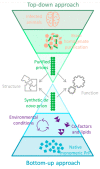Essential Components of Synthetic Infectious Prion Formation De Novo
- PMID: 36421708
- PMCID: PMC9687555
- DOI: 10.3390/biom12111694
Essential Components of Synthetic Infectious Prion Formation De Novo
Abstract
Prion diseases are a class of neurodegenerative diseases that are uniquely infectious. Whilst their general replication mechanism is well understood, the components required for the formation and propagation of highly infectious prions are poorly characterized. The protein-only hypothesis posits that the prion protein (PrP) is the only component of the prion; however, additional co-factors are required for its assembly into infectious prions. These can be provided by brain homogenate, but synthetic lipids and non-coding RNA have also been used in vitro. Here, we review a range of experimental approaches, which generate PrP amyloid assemblies de novo. These synthetic PrP assemblies share some, but not necessarily all, properties of genuine infectious prions. We will discuss the different experimental approaches, how a prion is defined, the non-protein requirements of a prion, and provide an overview of the current state of prion amplification and generation in vitro.
Keywords: PMCA; RT-QuIC; aggregation; infectivity; prions; synthetic prions.
Conflict of interest statement
The authors declare no conflict of interest.
Figures



References
Publication types
MeSH terms
Substances
Grants and funding
LinkOut - more resources
Full Text Sources
Medical
Research Materials

